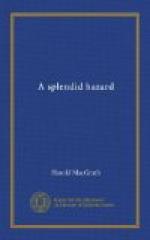CHAPTER XXIV
THE PINES OF AITONE
Before sun-up they were on the way again. They circled through magnificent gorges now, of deep red and salmon tinted granite, storm-worn, strangely hollowed out, as if some Titan’s hand had been at work; and always the sudden disappearance and reappearance of the blue Mediterranean.
The two young women rode in the same carriage. Occasionally the men got down out of theirs and walked on either side of them. Whenever an abrupt turn showed forward, Fitzgerald put his hand in his pocket. From whichever way it came, he, at least, was not going to be found unprepared. Sometimes, when he heard M. Ferraud’s laughter drift back from the admiral’s carriage, he longed to throttle the aggravating little man. Yet, his admiration of him was genuine. What a chap to have wandered round with, in the old days! He began to realize what Frenchmen must have been a hundred years gone. And the strongest point in his armor was his humanity; he wished no one ill. Gradually the weight on Fitzgerald’s shoulders lightened. If M. Ferraud could laugh, why not he?
“Isn’t that view lovely!” exclaimed Laura, as the Capo di Rosso glowed in the sun with all the beauty of a fabulous ruby. “Are you afraid at all, Hildegarde?”
“No, Laura; I am only sad. I wish we were safely on the yacht. Yes, yes; I am afraid, of something I know not what.”
“I never dreamed that he could be dishonest. He was a gentleman, somewhere in his past. I do not quite understand it all. The money does not interest my father so much as the mere sport of finding it. You know it was agreed to divide, his share among the officers and seamen, and the balance to our guests. It would have been such fun.”
And the woman who knew everything must perforce remain silent. With what eloquence she could have defended him!
“Do you think we shall find it?” wistfully.
“No, Laura.”
“How can he find his way back without passing us?”
“For a desperate man who has thrown his all on this one chance, he will find a hundred ways of returning.”
A carriage came round one of the pinnacled calenches. It was empty. M. Ferraud casually noted the number. He was not surprised. He had been waiting for this same vehicle. It was Breitmann’s, but the man driving it was not the man who had driven it out of Ajaccio. He was an Evisan. A small butterfly fluttered alongside. M. Ferraud jumped out and swooped with his hat. He decided not to impart his discovery to the others. He was assured that the man from Evisa knew absolutely nothing, and that to question him would be a waste of time. At this very moment it was not unlikely that Breitmann and his confederate were crossing the mountains; perhaps with three or four sturdy donkeys, their panniers packed with precious metal. And the dupe would go straight to his fellow-conspirators and share his millions. Curious old world!




